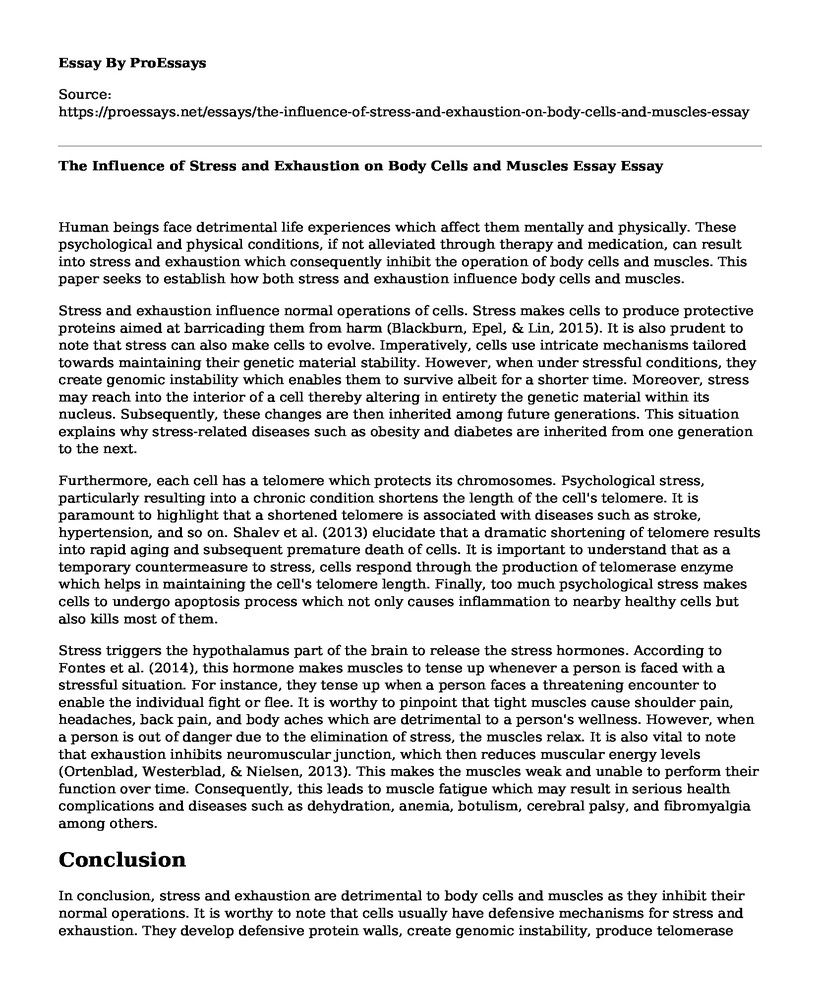Human beings face detrimental life experiences which affect them mentally and physically. These psychological and physical conditions, if not alleviated through therapy and medication, can result into stress and exhaustion which consequently inhibit the operation of body cells and muscles. This paper seeks to establish how both stress and exhaustion influence body cells and muscles.
Stress and exhaustion influence normal operations of cells. Stress makes cells to produce protective proteins aimed at barricading them from harm (Blackburn, Epel, & Lin, 2015). It is also prudent to note that stress can also make cells to evolve. Imperatively, cells use intricate mechanisms tailored towards maintaining their genetic material stability. However, when under stressful conditions, they create genomic instability which enables them to survive albeit for a shorter time. Moreover, stress may reach into the interior of a cell thereby altering in entirety the genetic material within its nucleus. Subsequently, these changes are then inherited among future generations. This situation explains why stress-related diseases such as obesity and diabetes are inherited from one generation to the next.
Furthermore, each cell has a telomere which protects its chromosomes. Psychological stress, particularly resulting into a chronic condition shortens the length of the cell's telomere. It is paramount to highlight that a shortened telomere is associated with diseases such as stroke, hypertension, and so on. Shalev et al. (2013) elucidate that a dramatic shortening of telomere results into rapid aging and subsequent premature death of cells. It is important to understand that as a temporary countermeasure to stress, cells respond through the production of telomerase enzyme which helps in maintaining the cell's telomere length. Finally, too much psychological stress makes cells to undergo apoptosis process which not only causes inflammation to nearby healthy cells but also kills most of them.
Stress triggers the hypothalamus part of the brain to release the stress hormones. According to Fontes et al. (2014), this hormone makes muscles to tense up whenever a person is faced with a stressful situation. For instance, they tense up when a person faces a threatening encounter to enable the individual fight or flee. It is worthy to pinpoint that tight muscles cause shoulder pain, headaches, back pain, and body aches which are detrimental to a person's wellness. However, when a person is out of danger due to the elimination of stress, the muscles relax. It is also vital to note that exhaustion inhibits neuromuscular junction, which then reduces muscular energy levels (Ortenblad, Westerblad, & Nielsen, 2013). This makes the muscles weak and unable to perform their function over time. Consequently, this leads to muscle fatigue which may result in serious health complications and diseases such as dehydration, anemia, botulism, cerebral palsy, and fibromyalgia among others.
Conclusion
In conclusion, stress and exhaustion are detrimental to body cells and muscles as they inhibit their normal operations. It is worthy to note that cells usually have defensive mechanisms for stress and exhaustion. They develop defensive protein walls, create genomic instability, produce telomerase enzyme to protect themselves from stressful conditions. However, excess stress alters genetic composition of cells leading inheritable conditions such as diabetes and hypertension among others. For muscles, stress makes them tense up in preparation for flight or flight. Nonetheless, too much stress and exhaustion result into the development of muscle fatigue that causes serious health complications. Therefore, people should always strive to avoid stressful condition and exhaustion for healthy living.
References
Blackburn, E. H., Epel, E. S., & Lin, J. (2015). Human telomere biology: a contributory and interactive factor in aging, disease risks, and protection. Science, 350(6265), 1193-1198.
Fontes, M. A. P., Xavier, C. H., Marins, F. R., Limborco-Filho, M., Vaz, G. C., Muller-Ribeiro, F. C., & Nalivaiko, E. (2014). Emotional stress and sympathetic activity: contribution of dorsomedial hypothalamus to cardiac arrhythmias. Brain research, 1554, 49-58.
Ortenblad, N., Westerblad, H., & Nielsen, J. (2013). Muscle glycogen stores and fatigue. The Journal of physiology, 591(18), 4405-4413.
Shalev, I., Entringer, S., Wadhwa, P. D., Wolkowitz, O. M., Puterman, E., Lin, J., & Epel, E. S. (2013). Stress and telomere biology: a lifespan perspective. Psychoneuroendocrinology, 38(9), 1835-1842.
Cite this page
The Influence of Stress and Exhaustion on Body Cells and Muscles Essay. (2022, Aug 23). Retrieved from https://proessays.net/essays/the-influence-of-stress-and-exhaustion-on-body-cells-and-muscles-essay
If you are the original author of this essay and no longer wish to have it published on the ProEssays website, please click below to request its removal:
- Role of the Telomerase Enzyme in Cancer Biology
- Reflective Essay on Nursing Meeting
- Classical Conditioning in Psychology Paper Example
- What is Trust? - Essay Sample
- SLP Eval. & Manage. of Hyperkinetic Disorders Affecting Communication & Swallow - Essay Sample
- Research Paper on Analysis of Stability in Underground Auditorium Structure
- Essay Example on Quality Care in Healthcare Systems: Improving Safety and Outcomes







